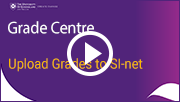Monday 4 November
Recording Exam Results in Grade Centre
Using Grade Centre may be an opportunity to enhance grade management and security compared to the use of spreadsheets. Grade Centre has built-in logging and monitoring of data which has been an important part of resolving mistakes in the past. Tips for efficiently recording your exam results in Grade Centre include:
- Creating Manual entry columns to record the results of each exam section.
- Ensuring results are not made available to students by changing the Grade Centre column settings - Hide from Students (on/off).
- Improving the ease of entering results by hiding all unnecessary columns in Manage > Column Organisation. Columns can be redisplayed once you have finished entering results. For more information, refer to the Show, Hide and Change Column order guide.
- Using a Total or Weighted column to add exam section results so an exam's total results can be calculated .
- Performing non-standard calculations by using the spreadsheet download and upload capability.
Reminder: The SI-net merge tool can be used to download Grade Centre marks to a spreadsheet in the correct format for upload to SI-net.
For additional information, refer to the Grade Centre tool page.
New Course Insights Workshop
Course Insights is a course-level, academic facing learning analytics dashboard that provides information on student cohort demographics, online engagement and assessment results. In this workshop, you will develop an understanding of how to use data to analyse student learning, discuss possible teaching strategies and interventions based on your course cohort, as well as learn practical skills on how to use the tool.
Register now for the 11 November workshop.
Active Learning Platform (ALP) - Adopter Support
Adopter support is now available for teaching staff interested in implementing the active learning functionality available in Echo360, UQ's lecture recording system. The Active Learning Platform (ALP) provides a range of functionality to facilitate class engagement and participation. For example, you can add polls and open-ended questions to lecture slides uploaded to the system, which students can respond to in real-time during a lecture using their own smart devices. For more information, please refer to the Echo360 ALP Deployment project page. All adopters will be provided with technical and implementation support from an eLearning Adviser. If you are interested in volunteering for the Active Learning Platform (ALP) adopter support, please email elearningadvisers@uq.edu.au.
Immersive Reality Community of Practice
The Immersive Reality Community of Practice (IRCoP) was launched during Teaching and Learning Week. This CoP is a place to share examples of practice and help coordinators understand how immersive technologies can be applied to teaching. If you are interested in joining the email list to share or learn about virtual reality, mixed reality, augmented reality and more, please contact elearningadvisers@uq.edu.au.
Order your Summer Semester courses now
You can request your Learn.UQ (Blackboard) course for Summer Semester, 2019 and Semester 1, 2020 now!
1. Use the online Site Request form located on the Staff tab in Learn.UQ. This form also allows you to request a copy of course content from a previous semester.

OR
2. Publish your Electronic Course Profile (ECP) for a blank course template to be created automatically within 48 hours. For content to be copied, request a 'copy' through the Staff tab mentioned in the previous step.
For step-by-step instructions, refer to the guide on Course Requests.
SI-net Grade Upload Tool
Dr Peter Clutterbuck discusses his use of the SI-net Grade Upload tool to finalise student grades in his undergraduate and postgraduate courses, as well as the benefits of the tool being integrated within the Learn.UQ (Blackboard) Grade Centre (YouTube, 1m 53s).

Top 5 Finalising grades tips
Tip 1: Check column settings - Points possible
In Grade Centre, for each assessment column, check the Points Possible setting is set to the item total (i.e. not zero). For step-by-step instructions, refer to the guide Create Grade column.
Tip 2: Total and Weighted total columns
In Grade Centre, calculated columns can be used to calculate finalised results without the need of a spreadsheet. For the Calculate as Running Total setting, ensure you select No, so cells without marks (i.e. no submission) are included in the calculation with the value of zero. For step-by-step instructions, refer to the Total Column and Weighted Column guides.
Tip 3: Check the history of mark changes
Grade Centre logs a record of all changes made to marks during the semester. At the end of the semester, you can use the View Grades History tool to produce a report that shows all changes and comments, to confirm the validity and check for errors. For step-by-step instructions, refer to the Grade History Report guide.
Tip 4: Grade Schema
In Grade Centre, a Grade Schema can be set up to automatically allocate 1-7 grades based on percentage boundaries. For step-by-step instructions, refer to the Create a Grade Schema (1-7 grades) guide.
Tip 5: SI-net merge & SI-net grade upload tool
Coordinators are reminded there are two methods for sending grades from Grade Centre to SI-net:
- The SI-net merge tool allows the download of Grade Centre marks to a spreadsheet in the correct format for upload to SI-net. For step-by-step instructions, refer to the guide on Upload grades to SI-net.
- The Upload Grades to SI-net tool allows you with the required SI-net access (same access as for the CSV upload) to directly transfer grades from Grade Centre. For step-by-step instructions, refer to the guide on Upload grades to SI-net (Direct).
Digital Citizenship - Digital Essentials Module
The Digital Citizenship module introduces students to online safety and wellbeing, appropriate online behaviour and their digital footprint. It is designed to be embedded into courses so students can find the information they need, when they need it. For more information, please refer to the Digital Essentials webpage.

Check the history of mark changes
Grade Centre history records all changes made to marks during the semester. At the end of the semester, you can use the View Grades History tool to produce a report that shows all changes and comments, to confirm validity and check for errors. For step-by-step instructions refer to guides on Grades security, Edit a mark and record a reason and View Grade History report.

ITaLI eLearning Workshops
The ITaLI eLearning team are offering a range of professional development workshops to support staff in implementing Technology Enhanced Learning during 2019. For a description of each workshop, dates and to register, visit the Staff Development / Teaching and Learning Technologies site.
Online workshops include:
Upcoming face-to-face workshops include:
- Learn.UQ Grade Centre, 12:00pm - 2:00pm, 6 November, St Lucia
- Learn.UQ Basics, 9:30am - 12:00pm, 8 November, St Lucia
- Course Insights, 2:00pm - 4:00pm, 11 November, St Lucia
- Desktop Recording (Kaltura Capture), 10:00am - 12:00pm, 12 November, St Lucia
- Learn.UQ: Quizzes, Tests and Exams, 9:30am - 12:00pm, 19 November, St Lucia
- Echo360 Active Learning Platform, 10:00am - 12:00pm, 22 November, St Lucia
- Basic Video Production, 9:30am - 12:00pm, 26 November, St Lucia
- Virtual Classroom (Zoom), 10:00am - 12:00pm, 27 November, St Lucia
- UQ Active Learning Tools, 10:00am - 12:00pm, 29 November, St Lucia
- Learn.UQ Basics, 9:30am - 12:00pm, 2 December, St Lucia
- Turnitin, 10:00am - 12:00pm, 5 December, St Lucia
- Learn.UQ: Quizzes, Tests and Exams, 9:30am - 12:00pm, 11 December, St Lucia
- Echo360 Active Learning Platform, 10:00am - 12:00pm, 12 December, St Lucia
Custom eLearning Workshops
Custom workshops on centrally supported eLearning tools are available on request for faculties and schools. Email elearningadvisers@uq.edu.au with the subject line Custom Workshop to schedule one of our teaching and learning workshops at a convenient time.
ITaLI Teaching and Learning Workshops
- Tasks, activities and student learning – Visiting Fellow Prof. Peter Goodyear (University of Sydney), 12:00pm - 1:30pm, 7 November, St. Lucia
- Setting Up for a Successful Semester, 9:30am - 11:30am, 29 November, St Lucia
eLearning Solutions Service
The eLearning Solutions Service offers one-on-one consultations to course teaching staff on the integration of eLearning tools into their courses. The service currently supports a range of eLearning tools, all of which can be found on the eLearning Solutions Service webpage. All eLearning Educational Advisers have either a BEd or GradDipEd. Staff can nominate for the eLearning Solutions Service by booking via the appointments webpage to organise an individual consultation at your office.
Request Support
To receive a quick response to your eLearning support request, log a job with eLearning Support using help@learn.uq.edu.au. Alternatively, you may use the Request Support button available inside Learn.UQ.
To enable a timely response please be sure to include as much information as possible with your request.








